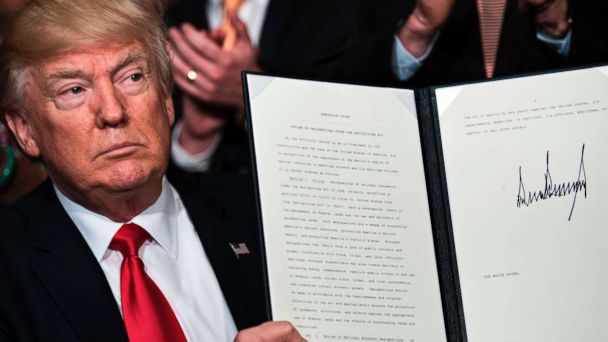Trump expected to announce decision to shrink 2 national monuments in Utah
Trump has weighed reducing the size of several national monuments.
— -- President Donald Trump is expected to announce that he will shrink two national monuments in Utah on Monday, his final decision as a result of a federal review of monuments that began earlier this year.
Trump has been considering whether to reduce the size of several national monuments as part of a review started earlier this year. He is expected to announce his decision to change the boundaries of two monuments in Utah, Bears Ears National Monument and Grand Staircase-Escalante National Monument.
Utah Sen. Orrin Hatch confirmed Thursday night that the president accepted his invitation and that the president told him on a phone call last month "I'm approving the Bears Ears recommendation for you, Orrin."
The White House did not confirm the conversation between the senator and the president.
Trump is expected to announce that Bears Ears will be reduced to around 180,000 acres from 1.35 million and that Grand Escalante, which is about 1.9 million acres, could be trimmed by half, according to the Salt Lake Tribune.
The decision about Bears Ears is especially controversial because it was designated specifically because of its sacred meaning to Native American tribes in the area, including the Navajo and Hopi Nations.
The monument is also unique because a commission of representatives from five tribes advocated for its creation and are charged with advising the government on how to manage the land. Officials in Utah have said President Obama abused his power by designating so much land as part of a national monument against their wishes and even said the monument hurts the local Uranium mining industry in a comment posted on the review by a Utah legislature commission.
Zinke said he did believe some areas of Bears Ears should be protected and defended the decision to shrink the monument's borders on a call with reporters shortly after he sent his recommendations to the president.
"If you look at the Bear Ears as a whole," he said on the call. "There is a lot more drop-dead gorgeous land there is historic landmarks, historic structures and other objects."
Zinke also said on that call that the specifics of how the borders will be changed will be decided in a process with local leaders to make sure all archaeological sites were protected while opening up as much land as possible but the administration has not confirmed any details.
But local leaders say the monument should not be changed at all and that, even though Zinke met with Native American groups during a visit to Utah, they were not given as much consideration as elected officials who want to shrink the monument. A nonprofit that works to protect culturally significant public lands called Utah Dine Bikeyah held protests during Zinke's visit.
"Bears Ears holds our prayers, medicine, and sacred grounds. Bears Ears National Monument honors Native Americans and provides a path for healing. President Trump should leave it alone and respect our people,” UDB Board Member Jonah Yellowman said in a statement after Utah Sen. Orrin Hatch announced the upcoming changes to the monument.
The decision to shrink the monument will be the second time in recent weeks that Native American groups have been unhappy with the president. In an event honoring Navajo code talkers the president used his nickname for Sen. Elizabeth Warren, "Pocahontas," which many groups said is offensive to Native Americans.

The president called for the review of 27 monuments designated under the Antiquities Act in an executive order signed in April. Zinke visited several of the monuments, including Bears Ears and Grand Staircase, before sending his recommendations to Trump in May.
The review included more than 2.8 million public comments.
When the order was signed, Trump criticized monuments designated under the Obama administration as an overreach of executive power, calling them a "federal land grab."
Monday's announcement is expected to face almost immediate legal challenges from environmental groups and groups that advocate for protecting public lands who say that the Antiquities Act does not give the president the authority to eliminate national monuments once they've been created.
The Antiquities Act was enacted in 1906 and grants presidents the power to declare land a federal monument but does not specifically say that a president can eliminate a national monument.
The Congressional Research Service wrote a report on this issue in 2016 that found that while the Antiquities Act doesn't specifically grant the president the power to shrink or eliminate monuments it does say that monument size "shall be confined to the smallest area compatible with the proper care and management of the objects to be protected," which could be used to justify making the monument smaller.
A draft of Zinke's recommendations published by the Washington Post includes suggestions to change eight additional monuments but it's unclear if Trump will make announcement about those on Monday. The draft also shows that Zinke recommended the president create four new national monuments, including an area sacred to the Blackfeet Nation in his home state of Montana, the Medgar Evers home in Jackson, Mississippi, and a Union Army supply depot site in Kentucky.
Trump will travel to Utah on Monday. The Salt Lake Tribune reports that he is not expected to visit either of the monuments, but is expected to meet with leaders from the Mormon Church.